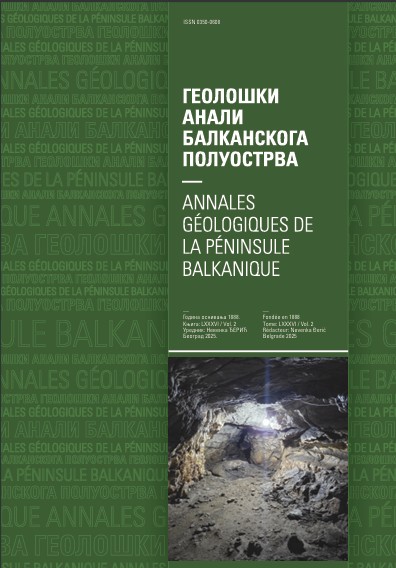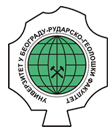Peer Review Process
All articles published in the Geološki anali Balkanskoga poluostrva undergo a rigorous double-blind peer-review process. The first review is based on an initial editors' screening and antiplagiarism checking, which is followed by a more detailed review by at least two anonymous reviewers. Each submitted manuscript is evaluated on the following basis:
- the originality of its contribution to the field of scholarly publishing;
- the soundness of its theory and methodology gave the topic;
- the coherence of its analysis;
- its ability to communicate to readers (grammar and style).
The choice of reviewers is at the Editor’s discretion. The reviewers must be knowledgeable about the subject area of the manuscript; they must not be from the Authors’ own institution and they should not have recent joint publications with any of the Authors. Reviews must be conducted objectively. Personal criticism of the author is inappropriate. Reviewers should express their views clearly with supporting arguments. Any manuscripts received for review must be treated as confidential documents.
Once the manuscript is accepted for publication, the Journal allows authors to share (copy and redistribute the material in any medium or format for any purpose, even commercially) and adapt published material (remix, transform, and build upon the material for any purpose, even commercially), at any time after publication in compliance with the Creative Commons Attribution 4.0 International License (CC BY).
Peer reviewers should
- Only agree to review articles for which they have the subject expertise required to carry out a proper assessment and which they can assess in a timely manner;
- Respect the confidentiality of peer review and not reveal any details of an article or its review, during or after the peer-review process, beyond those that are released by the journal;
- Not use information obtained during the peer-review process for their own or any other person’s or organization’s advantage or to disadvantage or discredit others;
- Declare all potential conflicting interests, seeking advice from the journal if they are unsure whether something constitutes a relevant interest;
- Not allow their reviews to be influenced by the origins of an article, by the nationality, religious or political beliefs, gender or other characteristics of the authors, or by commercial considerations;
- Be objective and constructive in their reviews, refraining from being hostile or inflammatory and from making libelous or derogatory personal comments;
- Acknowledge that peer review is largely a reciprocal endeavor and undertake to carry out their fair share of reviewing in a timely manner;
- Provide journals with personal and professional information that is accurate and a true representation of their expertise;
- Recognize that impersonation of another individual during the review process is considered serious misconduct.
Initial phase
Before starting the revision process, if there is any conflict of interest, lack of expertise in a concrete scientific area, or need extra time, please notify the Editor-in-Chief. Each received article is forwarded to two independent reviewers – a double-blind peer-review process (reviewers do not know who the author of the article is, and the author does not know who the reviewers of his article are). We insist on anonymity because we believe that this procedure will contribute to more independent, more critical, and better examination papers. If you are unable to comply with deadlines, please inform without delay and notify the Editor-in-Chief. The typical time allowed for reviews is four to five weeks. If the decisions of the two reviewers are not the same (accept/reject), the Editor-in-Chief may assign additional reviewer(s). The purpose of peer review is to assist the Editor in making editorial decisions. Editorial communications with the author may also assist the author in improving the paper. The reviewer does not have the rights to the content of the paper, the other, or that data from the article that benefits are reviewed for any purpose. Reviewers have an obligation to care about ethical issues. If the paper is plagiarized or if the same title is published in another journal or proceedings, please inform without delay and notify the Editor-in-Chief. At the beginning of the reviewer form, the reviewer states his name, title, and the full name of the institution where he or she works. These data are confidential, remain with the editorial board and they will not be sent to the author of the article, in addition to the required corrections, suggestions, and complaints if any.
Writing a review report
Complete all the review questions in the report form. Write your report on the quantities work. Please provide comments and suggestions constructive and useful for the authors to improve the scientific quality and presentation of the manuscript. If you are submitting a reviewer’s report to reject the manuscript, you are asked to provide the reasons for rejection.
General recommendations:
- Be objective and constructive in your reviews and provide feedback that will help the authors improve their manuscript.
- Do not make unfair negative comments or include unjustified criticisms of any competitors' work that is mentioned in the manuscript.
- Ensure your comments and recommendations for the editor are consistent with your report for the authors (most feedback should be put in the report for the authors).
- Remember it is the authors' paper and not attempt to rewrite it to your own preferred style if it is basically sound and clear. Suggestions for changes that improve clarity are, however, important.
- Be aware of the sensitivities surrounding language issues that are due to the authors writing in a language that is not their own, and phrase the feedback appropriately and with due respect.
- Any suggestion that the author includes citations to reviewers’ (or their associates’) work must be for genuine scientific reasons and not with the intention of increasing reviewers’ citation counts or enhancing the visibility of reviewers’ work (or that of their associates).
- If you suspect plagiarism, fraud or have other ethical concerns, raise your suspicions with the Section Editor, providing as much detail as possible. Visit the COPE guidelines for more information: Guidelines | COPE: Committee on Publication Ethics
- Since peer review is confidential, please do not share the review or information about the review with anyone without the agreement of the editors and authors involved. This applies both during and after the publication process.
Questions to have in mind when preparing a review report:
- Does the manuscript fit the scope of Geološki anali Balkanskoga poluostrva?
- Would the manuscript be of interest to the readership of the journal?
- Does the manuscript help to expand or further research in this subject area?
- Do you feel that the significance and potential impact of a manuscript is high or low?
- Is the manuscript complete and does it contain all the sections needed for a research paper?
- Is the methodology presented in the manuscript and any analysis provided both accurate and properly conducted?
- Are all relevant accompanying data, citations, or references given by the author?
- Should it be shortened and reconsidered in another form?
Make a recommendation
After you finished reading the paper and have assessed its quality, you need to make a recommendation to the Editor-in-Chief regarding publication. You should make one of the next decisions:
Accept submission– if the manuscript is suitable for publication in its current form.
Revisions required – if the manuscript will be ready for publication after revisions. Please list the revisions you would recommend to the author.
Resubmit for review – if the manuscript would benefit from substantial changes and you would like to see the corrections before the manuscript is sent to the Editor for decision.
Decline submission– if the manuscript is not suitable for publication with this journal or if the revisions that would need to be undertaken are too fundamental for the submission to continue being considered in its current form.
Revised papers
When authors revise their article in response to reviewers' comments, they should be asked to resubmit a list of changes and any comments for transmission to the reviewers. If possible, the revised version is usually returned to the original reviewer, who is then asked to affirm whether the revisions have been carried out satisfactorily.
What if you cannot make a review
If you cannot make a review, you should immediately notify the editorial office that you cannot do this job. If you are unable to complete your report on a paper in the agreed time frame, inform the editorial office as soon as possible so that the refereeing procedure is not delayed.










